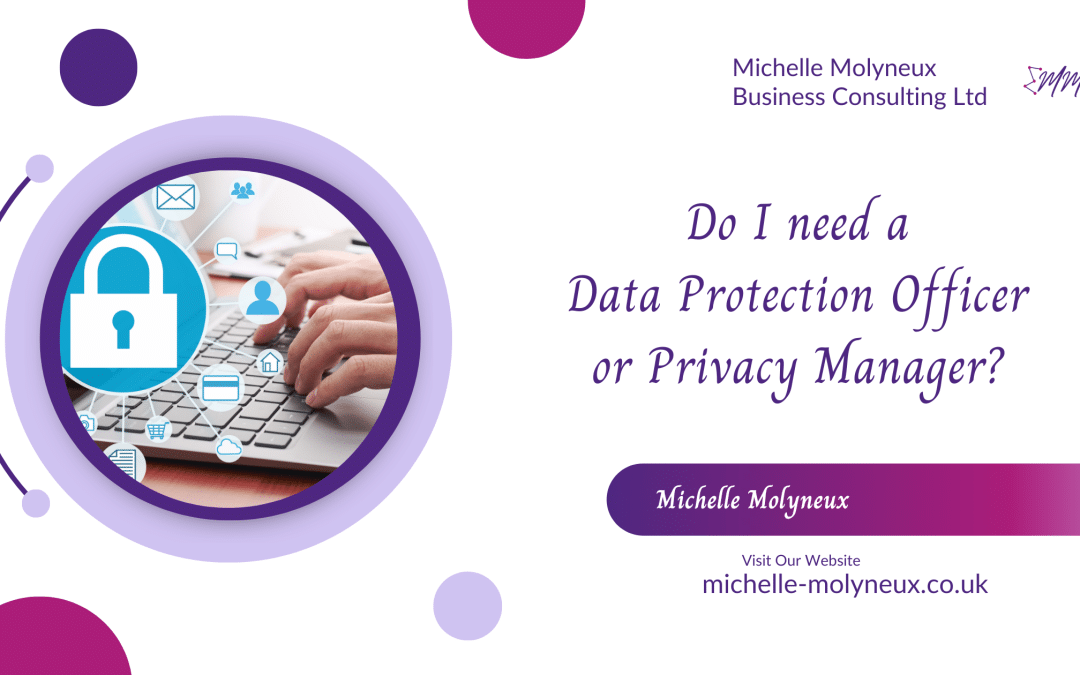Introduction
As businesses grow, data protection becomes increasingly important, especially with the rise in hybrid working models. Many organisations appoint a Data Protection Officer (DPO) or Privacy Manager to ensure compliance with data protection regulations. But do small businesses need someone to oversee data protection? In this blog post, we will discuss the roles of a DPO and Privacy Manager in more detail and help you determine which is right for your business.
Understanding GDPR and the Data Protection Act
The General Data Protection Regulation (GDPR) and the Data Protection Act 2018 (DPA 2018) set the framework for data protection laws in the UK and the EU. GDPR applies to any organisation processing the personal data of individuals within the EU, and the DPA 2018 complements GDPR by providing UK-specific regulations. Compliance with these laws is crucial for protecting individuals’ privacy and avoiding fines.
Do I Need a Data Protection Officer?
Appointing a Data Protection Officer (DPO) is not mandatory for all businesses. Under GDPR, a DPO must be appointed if a business:
- It is a public authority or body.
- Engages in large-scale monitoring of data subjects.
- Processes large-scale special categories of data or data relating to criminal convictions and offences.
For example, a business with over 250 staff or a health and social care provider with a significant client base collecting sensitive medical data would need a DPO.
Roles and Responsibilities of a DPO
A DPO’s primary responsibility is to ensure the organisation complies with GDPR and other privacy laws. The DPO must provide independent advice and act as a contact point for the supervisory authority. Key duties include:
- Informing and advising the organisation about GDPR obligations.
- Monitoring compliance with GDPR and other privacy laws.
- Providing advice on Data Protection Impact Assessments (DPIAs).
- Acting as the contact point for the supervisory authority.
Qualifications and Skills of a DPO
DPOs typically have a background in law, information technology, or privacy. They need in-depth knowledge of GDPR and data protection laws and must operate independently within the organisation.
For more information on a DPO, check out the ICO PDF guidance.
What is a Privacy Manager or Privacy Officer?
For organisations that don’t need to appoint a DPO under GDPR or choose not to do so, appointing a Privacy Manager is a good idea. The role of a Privacy Manager is not legally defined, but organisations can tailor it according to their specific needs. Privacy Managers oversee data protection and privacy programs, handle data leaks, and respond to data subject requests.
Roles and Responsibilities of a Privacy Manager
A Privacy Manager’s duties include:
- Implementing GDPR and overseeing the data protection program.
- Managing privacy program operations.
- Creating data protection policies.
- Educating employees about data privacy through training.
- Conducting risk assessments and DPIAs.
- Leading the organisation’s response to data incidents.
Qualifications and Skills of a Privacy Manager
While not legally defined, Privacy Managers should have a strong understanding of data protection principles. They often come from backgrounds in privacy, compliance, or IT. They need to be detail-oriented and capable of handling various privacy-related tasks.
So, What’s the Difference?
The DPO role is explicitly mentioned in GDPR and is a legal requirement under specific circumstances. It is an independent role focusing on overseeing compliance. In contrast, the Privacy Manager role is more flexible and hands-on, tailored to the organisation’s needs and focused on implementing data protection measures.
Depending on the business size, you may have a DPO who is also ‘hands-on’, or you may have a Privacy Manager or both, where the DPO oversees compliance and the Manager implements data protection and, as a result, collaborates to ensure comprehensive data protection compliance.
Frequently Asked Questions (FAQ)
Q: When is it mandatory to appoint a DPO? A: Appointing a DPO is mandatory if your business is a public authority, engages in large-scale monitoring of data subjects, or processes large-scale special categories of data.
Q: Can a small business benefit from having a Privacy Manager? A: Even small businesses can benefit from a Privacy Manager overseeing data protection practices and ensuring compliance with data protection laws. Think of it this way: do you want to deal with this ‘headache’ or have someone else do it for you?
Q: What are the consequences of not appointing a DPO when required? A: Failing to appoint a DPO when required can lead to significant fines and legal consequences under GDPR.
Q: Does the DPO or Privacy Manager have to be an employee? A: No, it does not have to be an employee, especially with micro and small businesses. Just like you would outsource your IT or HR support, you can outsource your data protection support and management.
Q: How do I choose between a DPO and a Privacy Manager? A: Consider your organisation’s size, nature of data processing activities, and specific compliance needs. Or call us, and we will help you make an informed decision.
Conclusion
With the increasing importance of data protection, many organisations appoint Data Protection Officers or Privacy Managers to ensure compliance with data protection regulations. Depending on the organisation’s size and needs, a DPO can oversee compliance, while a Privacy Manager handles the hands-on work of implementing data protection measures. Don’t forget, a DPO can also, where necessary, do the ‘hands-on work’. Every business is different, so it is down to your requirements.
Call to Action
If you’re unsure whether your business needs a DPO or a Privacy Manager or need assistance with data protection compliance, book a free clarity call with us today to ensure your business fully complies with data protection regulations.
Other blogs that may be of interest
- Privacy management: what is all the fuss about
- What are privacy managers and data protection officers?

